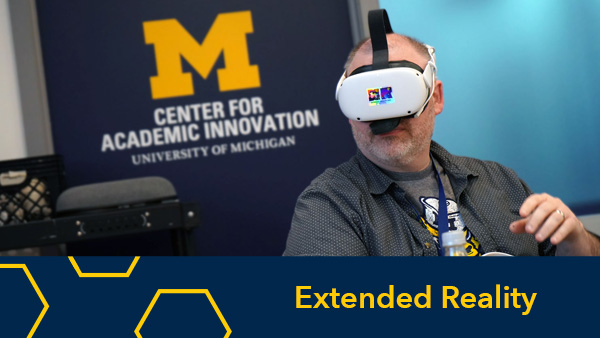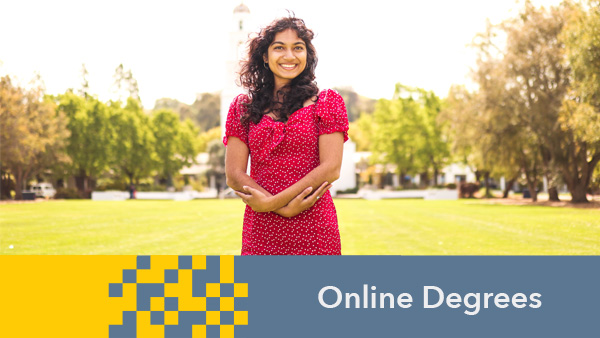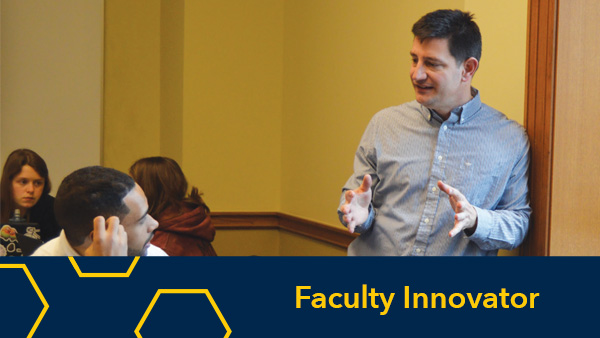Eric Joyce, Marketing Specialist
@ericmjoyce
How can technology better connect University of Michigan alumni with residential students and learners around the world?
Members of the “Fostering Broad and Enduring Participation” faculty design group and representatives from the Alumni Association of the University of Michigan explored this question and more earlier this fall. The collaborative brainstorm was held during “Innovation Hour,” an event hosted by the Office of Academic Innovation two times per month featuring a different theme each session. This discussion surrounded the theme of “Lifelong Learning” and focused on ways digital platforms could streamline processes to better reach and engage with U-M alumni as well as how Michigan can continue to support the educational needs of alumni as lifelong learners.
“We have alumni who are willing to engage, the challenge is capturing that information and using it in an effective way,” said Dr. Shelly Connor, Executive Director for Alumni Education and Enrichment for the Alumni Association.
This session and the faculty design groups are components of the Academic Innovation Initiative, a charge by President Schlissel and Provost Pollock for the Office of Academic Innovation to engage in a University-wide conversation to “consider how U-M will lead the way for higher education through the information age and further strengthen our impact on society.”
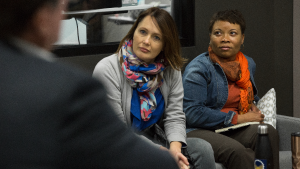 Dr. Joanna Millunchick, Arthur F Thurnau Professor of Materials Science and Engineering in the College of Engineering, discussed the shifting dimensions of alumni and residential student interaction. She asked how online tools could facilitate reciprocal learning between U-M alumni and students in Ann Arbor into integrative learning communities. The group explored how these communities could transform the alumni mentorship role to enable two-way learning, drawing from diverse learner backgrounds to enrich the learning experience.
Dr. Joanna Millunchick, Arthur F Thurnau Professor of Materials Science and Engineering in the College of Engineering, discussed the shifting dimensions of alumni and residential student interaction. She asked how online tools could facilitate reciprocal learning between U-M alumni and students in Ann Arbor into integrative learning communities. The group explored how these communities could transform the alumni mentorship role to enable two-way learning, drawing from diverse learner backgrounds to enrich the learning experience.
“It’s not so much a traditional classroom, but a learning community where alums can participate in these communities,” Millunchick said.
The blurring lines between students and alumni illustrated by reciprocal learning communities signal the evolving definition of a University of Michigan student. The group discussed how expanding access to online learning fueled by the growing prevalence of Massive Open Online Courses (MOOCs) has obscured the distinction between traditional and nontraditional students. Rachel Niemer, Director of the Gameful Learning Lab, noted how the increasing breadth of U-M’s online courses could mobilize the alumni community in a celebration of learning.
“What if there was one month a year where the entire U-M alumni base committed to learning something new?” Niemer said.
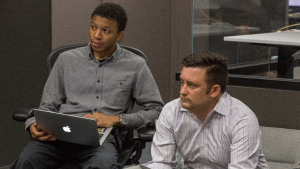 A key point of discussion focused on the opportunity for online courses to facilitate personalized learning. Several in attendance explored how online alumni networks could help guide lifelong learning in various career and life stages such as shortly after graduation, during periods of career transition and in mid-career stages.
A key point of discussion focused on the opportunity for online courses to facilitate personalized learning. Several in attendance explored how online alumni networks could help guide lifelong learning in various career and life stages such as shortly after graduation, during periods of career transition and in mid-career stages.
“There are different personas we’re reaching…and they have different goals,” said James DeVaney, Associate Vice Provost for the Office of Academic Innovation. “How do we think about different, right-size bundles of content?”
DeVaney noted educational opportunities should continually evolve in response to the educational demands and interests of learners. For example, supporting learners with new skills for professional development earlier in their career then shifting to an exploration of personal enrichment later in life.
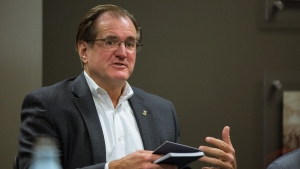 Steve Grafton, President and CEO of the Alumni Association, asked how technology can help sustain alumni interest in lifelong education at U-M, prompting alumni think of Michigan as their educational provider throughout their career and life.
Steve Grafton, President and CEO of the Alumni Association, asked how technology can help sustain alumni interest in lifelong education at U-M, prompting alumni think of Michigan as their educational provider throughout their career and life.
“We [can] create a sense where, ‘I go back to Michigan for whatever I need and Michigan is going to have it,’” Grafton said.
The group also speculated about the future of continuous education in the next 30 to 50 years. Some noted how stackable credentialing continues to pave new roads for learners allowing them to complete individual courses, or a series of courses, to earn a university-endorsed certificate. Not only has online education increased access to education for individuals, it has the potential to shape corporate education according to DeVaney. He said MOOCs are removing barriers that previously restricted career-enhancing professional development to select individuals, and the democratization of education now provides new learning opportunities for entire teams at all positional stages within an organization.
See Michigan’s portfolio of online learning opportunities available to all alumni and lifelong learners around the globe on our partner platforms Coursera and edX.
